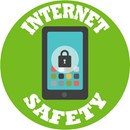
 Internet Safety
Internet Safety
Parent Resources
If you need any support or guidance about keeping children safe on line, here are a few things you can do;
- Visit the NSPCC or O2 NSPCC Website pages
- Call the O2 NSPCC Online Safety Helpline on 0808 800 5002
- Download the Net Aware app on Google Play or the App Store
10 tips for parents
1. Set up an account for each user on your pc at home and only giver yourself administrator access. This will allow you to keep control of the settings and the installation of software. Each user account can be password protected.
2. Add a screensaver protected by a password to your account so that if you leave your pc for 5 minutes you will have to enter your password. You can do this in the 'control panel'.
3. Encourage your family to use technology in a public part of the house and not in a bedroom. This applies not just to pcs but also to laptops, games consoles, internet browsers on phones etc.
4. Remember that many consoles come with family settings. For example if you want to disable or limit 'Xbox Live' on an Xbox 360 you can do so by going to 'Settings, Parental Controls'. There is also the option to add a mask to voices so that a youngster's voice sounds like that of an adult or even a robot.
5. Use a pop up blocker. Both Internet Explorer and Firefox come with their own pop-up blockers. If you are accessing a site that has a genuine pop up window that you need to access you should add it to the trusted sites rather than turn off the pop up blocker. the settings can be found in the 'Tools' menu of the browser.
6.Encourage your child not to open e-mails from unfamiliar email addresses and to avoid opening suspicious attachments. As far as possible you should encourage your child to use the school's Learning Platform as this provides a safer environment.
7. Set your favourite search engine to do 'safe searches'. This will make sure that a search returns to content suitable for all ages. For example, to set Google to do safe searches, click on search settings on the homepage and then ensure that moderate or strict filtering is enabled.
8. Adjust the security settings of your browser and pc. For example, Apple Macs allow users to change settings in the parental control preference pane. Windows Vista and Windows 7 also have parental control sections.
9. Keep virus protection software up to date.
10. Engage in their world - add them as a friend on social networking site, text them, discover what their games consoles do etc.
Social networking safety
Social networking allows many of us to keep in contact with people and to share details and photos of what is happening in our lives. Young people will have grown up surrounded by sites such as Facebook, Bebo, Snapchat and Instagram. Social networking sites will undoubtedly play an important part in the lives of youngsters as they get older and we need to ensure that we give the simple guidance to ensure that they use them safely.
5 simple rules to discuss at home
1. Adjust privacy settings - in Facebook you can select 'Settings, Privacy Settings, Profile'. This will allow you to restrict who sees information and prevents friends of friends seeing your posts and photos. In Bebo you can do a similar task by selecting 'Settings, Privacy Settings'.
The following link will take you to the NSPCC site, which will give more detailed information regarding other social and gaming sites. Please visit nspcc.org.uk
2. Think before you post - It is very easy to post a comment or photo in anger or frustration. By the time you remove it many people will have seen it and the harm is done.
3. Only add people who you know in real life as friends. Remember that just because someone has a photo showing them as 15 years old in their profile, they may be someone completely different.
4. Think carefully about how much you put on your profile - you don't need to tell everyone your address, date of birth and mobile number.
5.Pay attention to age restrictions - for example Facebook , Snapchat, Instagram and Bebo are for people aged 13 and over.
